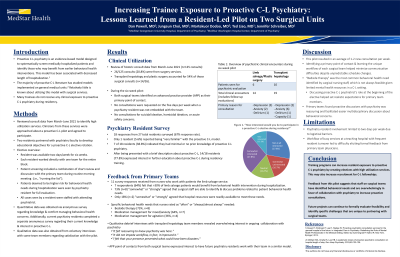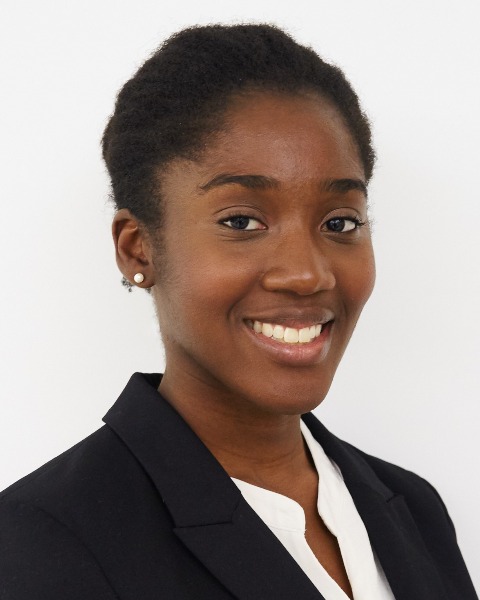Training and Education
Session: Poster Session
(189) Increasing Trainee Exposure to Proactive C-L Psychiatry: Lessons Learned from a Resident-Led Pilot on Two Surgical Units

Trainee Involvement: Yes
- DP
Dan Powell, MD
PGY4 psychiatry resident
Medstar Georgetown University Hospital
Washington, District of Columbia, United States - JC
Jungeun Choi, MD
Psychiatry Resident
Medstar Georgetown
Washington, District of Columbia, United States 
Martekuor Dodoo, MD (she/her/hers)
Psychiatrist
MedStar Washington Hospital Center
Washington, District of Columbia, United States.jpg)
Ted Liao, MD
Director, C-L Psychiatry Fellowship
MedStar Georgetown University Hospital
Washington, District of Columbia, United States- JS
Jennifer Schreiber, MD
Director, Psychiatric Consultation Service
Medstar Georgetown University Hospital
Kensington, Maryland, United States
Presenting Author(s)
Co-Author(s)
Background/Significance: Utilization data was gathered to identify services that frequently request psychiatric consultation. Educational objectives were identified, and the structure of a proactive screening process was developed in close consultation with the leadership of two surgical services. Two residents piloted the proactive model two days per week over a 6-week block. Additionally, psychiatry residents were administered a voluntary, anonymous survey which included brief educational material about proactive C-L to assess knowledge/interest about this model. Qualitative and quantitative consultee satisfaction data is being collected through Summer 2023. Review of utilization data identified limb salvage and transplant teams as two of the most common services to request psychiatric consultation, accounting for 43% of consultations from all surgical teams. These services were highly receptive to host psychiatry residents for a proactive elective, and qualitative data collected regarding consultees’ experience was very positive. Response rate from the resident survey was 67% (n=18/27). Of the 18 respondents, only 1 resident (5.6%) reported being “very familiar” with the proactive C-L model. After being provided with brief educational material, 14/18 residents (77%) reported interest in increased exposure to this model during residency. Quantitative data collection is ongoing, which will include results about consultee team satisfaction. Proactive C-L has the potential to facilitate novel and attractive learning opportunities and increase resident exposure to and interest in C-L psychiatry. Many C-L teaching services do not yet have an established proactive component, making this model a helpful way to increase trainee exposure to proactive C-L. Current psychiatry residents expressed a high degree of interest for increased exposure to this proactive model. Additionally, this pilot is the first known proactive model to work with transplant and limb salvage surgical subspecialities. These data suggest that it is feasible to implement an elective educational experience in proactive C-L for trainees, even in settings that do not previously have established proactive services. The use of psychiatric consultation utilization data can help guide effective partnerships for similar future electives. Fostering these types of elective opportunities has the potential to increase resident interest in C-L psychiatry and further explore the feasibility of proactive C-L on surgical services. References Desan P, Zimbrean P, Lee H, Sledge W: Proactive psychiatric consultation services for the general hospital of the future. in Integrated Care in Psychiatry: Redefining the Role of Mental Health Professionals in the Medical Setting. Edited by Summergrad P, Kathol R. New York, Springer; 2014. Oldham MA, Chahal K, Lee HB. A systematic review of proactive psychiatric consultation on hospital length of stay. Gen Hosp Psychiatry. 2019;60:120-126.
Proactive C-L psychiatry is an evidence-based, interdisciplinary model which involves systematic screening for mental health concerns to provide earlier interventions, and has been associated with decreased length of hospitalization (Desan et al., 2014; Oldham et al., 2019). Many trainees do not receive clinical exposure to proactive C-L during residency. This project aimed to create a resident elective experience in proactive C-L psychiatry in a hospital without a previously established proactive service.
Methods:
Results:
Discussion:
Conclusion/Implications:

